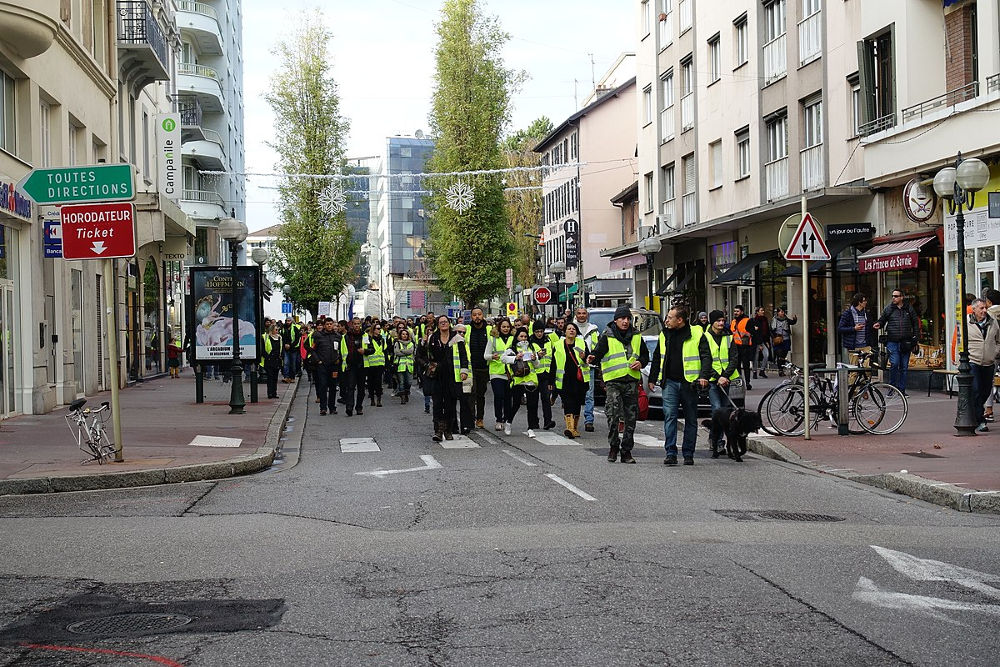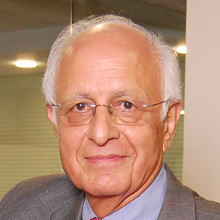[Yellow Vest protestors in France. Photo by Guilhem Vellut, CC BY 2.0]
‘What will the New Year bring?’ Is a question many of us ask ourselves. It is also the question that many economic and political forecasters and stock market analysts are asked.
How can we know what the future will bring? What are most visible to forecasters are the waves that appear on the surface: such as the ups-and-downs of stock-markets, the quarterly changes in GDP growth rates, and trends towards populism in elections in many countries.
When big systems, like the ocean, are in motion, changes deep within them cannot be noticed merely by looking at the surface. Watching the tide change, one can observe that the small waves right on top are moving one way, whereas the larger waves beneath them are moving the other way. Both oscillate, while beneath them a deeper, invisible current is moving masses of water forward to lift the tide.
Whether the stock market will be higher in February 2019 than it is in December 2018, or whether India’s GDP will be higher in 2019 than it was in 2017, are interesting questions, no doubt. However, more insightful will be an examination of deeper forces beneath the waves stirring above.
The tide of globalisation has clearly turned when the President of the USA declares to the UN General Assembly that ‘globalism is bad, and patriotism is good’. America First, he says. The rest be damned (except those who buy arms from America). Strongmen leaders in many countries—Vladimir Putin, Xi Jinping, Recep Erdogan, Narendra Modi, and others—are rallying people to recover pride in their culture and protect their nation’s autonomy. Brexit too was a rebellion against a perceived loss of national autonomy.
Beneath economic and political rumbles around the world lies a deeper conflict between two sets of ideas that have been spreading around the world in the last century. On one side are ideas about how economies should be constructed: along the principles of capitalism, property rights, and free markets. On the other side are ideas about how societies should be governed: along principles of democracy and human rights.
Democracy and capitalism were the two victors in the battle of ideologies which was supposed to have ended with the ‘end of history’, declared by political scientist Francis Fukuyama, upon the collapse of the Soviet Union. The underlying conflict between the two victors is now surfacing.
Capitalism and democracy run on different moral principles—of property rights and human rights
Capitalism and democracy run on different moral principles. Capitalism is founded on the moral principle of property rights. The right of every person, and also every institution that is considered a ‘person’ under the law such as a company, to own property, and to determine how it will be used, must be protected. In capitalism, how much you own should determine the weight you have in the governance of the enterprise. It is fair that someone who owns a million shares should have a million votes, whereas someone who owns only one share has only one vote. On the other hand, democracy is founded on the moral principle of human rights. Every human being, whether she has a billion dollars of wealth or none at all, has an equal vote. In capitalism, money counts. In democracy, life counts.
As citizens, people are troubled with the freedom given to capital to pursue its growth while eroding human rights
In a capitalist economy, a dollar is a vote. In a democratic society, every beating heart has a vote. The two different principles complicate governance. When an appliance designed to operate on DC power is connected into a socket providing AC power something will blow up. This is a fundamental cause of the political troubles arising in many countries. Even in the US, which led the so-called ‘free world’ against the Evil Empire behind the Iron Curtain, people are troubled by the power capitalist enterprises have acquired in the governance of their societies. As consumers in economies, people like the freedom of choice that market economies provide them. However, as citizens in societies, they are troubled with the freedom given to capital to pursue its growth while destroying the natural environment and eroding human rights.
Two bloody wars tore the world apart in the first half of the last century. Never again, the leaders of the world declared. In response, one set of international institutions emerged from conferences in Bretton Woods to govern the global economy—the International Monetary Fund (IMF), the World Bank, and the General Agreement on Tariffs and Trade (GATT, which later evolved into the World Trade Organization, or WTO). Another set of institutions formed in the United Nations Plaza in Manhattan, and grew into a plethora of UN organisations to advance the causes of human rights of people everywhere, for food, shelter, education, health, and freedom from persecution. The US, as the world’s largest economy, was the principal power in the governance of the economic institutions. In the UN General Assembly, the democratic principle of equality of all nations, rich or poor was applied. The US has often chafed at this, especially with its current political ideology of ‘America First’. Its view is that the capitalist principle must apply: those who contribute more money, as the US does, must have a greater say in what the institution does. More dollars must equate to more votes.
GATT acknowledged that countries’ economies were at different stages of development, and that countries must have room to shape policies that fit their needs aligned with broad global principles that would be fair for all. After the fall of the Berlin Wall and the strengthening of the Washington Consensus, GATT was changed to the WTO in the 1990s. WTO reduced room for national governments to shape their own trade and industrial policies. They would have to strictly follow universal rules and subject themselves to discipline by international bodies, the power in which lay with the richer countries. WTO’s agenda has evolved even further to propose ‘investor protection’ treaties, by which sovereign national governments (most of them democratically elected by citizens) would have to appear before tribunals who would protect the interests of wealthy international investors who would not even be citizens of their countries.
Meanwhile, in its own lumbering, consensual way, the UN flotilla has been going the other way to give more freedom and responsibility to national governments. All nations signed up for the aspirational Sustainable Development Goals (SDGs) in 2015 to advance the human rights agenda. There is a critical difference between the approach of the SDGs and the universal Millennium Development Goals that preceded them in 2000. The SDGs state that responsibility must lie with nations to devise their own, contextually appropriate strategies to achieve the goals. The SDGs acknowledge that to achieve large scale systemic change, action must be bottom up.
An underlying ‘theory-in-use’ driving the design of institutions for global and national governance, and even the design of large corporations, is that problems that appear everywhere require global solutions, produced by experts, to be imposed on people everywhere. Thus, governance becomes too remote from people. Whereas, complex systems, in which economic, societal, environmental, and political forces are intertwined, cannot be commanded to change top-down. ‘You think you are an expert, though you don’t understand’, people say. ‘And who the hell are you to tell us!’. This is the rumble of the rising wave of ‘populist’ political movements, of Left and Right, that is pushing back against globalism.
More people are becoming concerned with the long-term tides of global warming, environmental degradation, persistent poverty, and increasing inequality. After we have raised our champagne glasses to bring in the New Year, let us reflect on some forces of our own making that are reinforcing these tides that we fear may swamp us.
Global problems require local solutions
Good democratic governance is expected to be government of the people, for the people, and by people. Governments elected by the people are governments of the people, and for the people. People are becoming disenchanted with their elected governments because there is insufficient government by the people. To deepen democracy, governance must be devolved, into towns, villages and communities. Global problems require local solutions. Communities of stakeholders in local economies can find practical ways, which remote experts cannot, to reconcile contradictions between property rights and human rights, for the governance of their communities.
The trajectory of human progress must be changed. Just now, it is driven too much by narrow-minded pursuit of economic growth measured in monetary terms. The over-arching measure of the progress of a nation is its GDP. Even cities are compared by how much they contribute to the GDP. This paradigm of growth is catering to peoples’ needs as consumers. It is not fulfilling their aspirations as citizens of good societies. Broader, non-monetary, measures are required to assess the well-being of citizens. Moreover, to make the world better for everyone, citizens must learn to be better citizens and to democratically govern the local systems within which they live.

